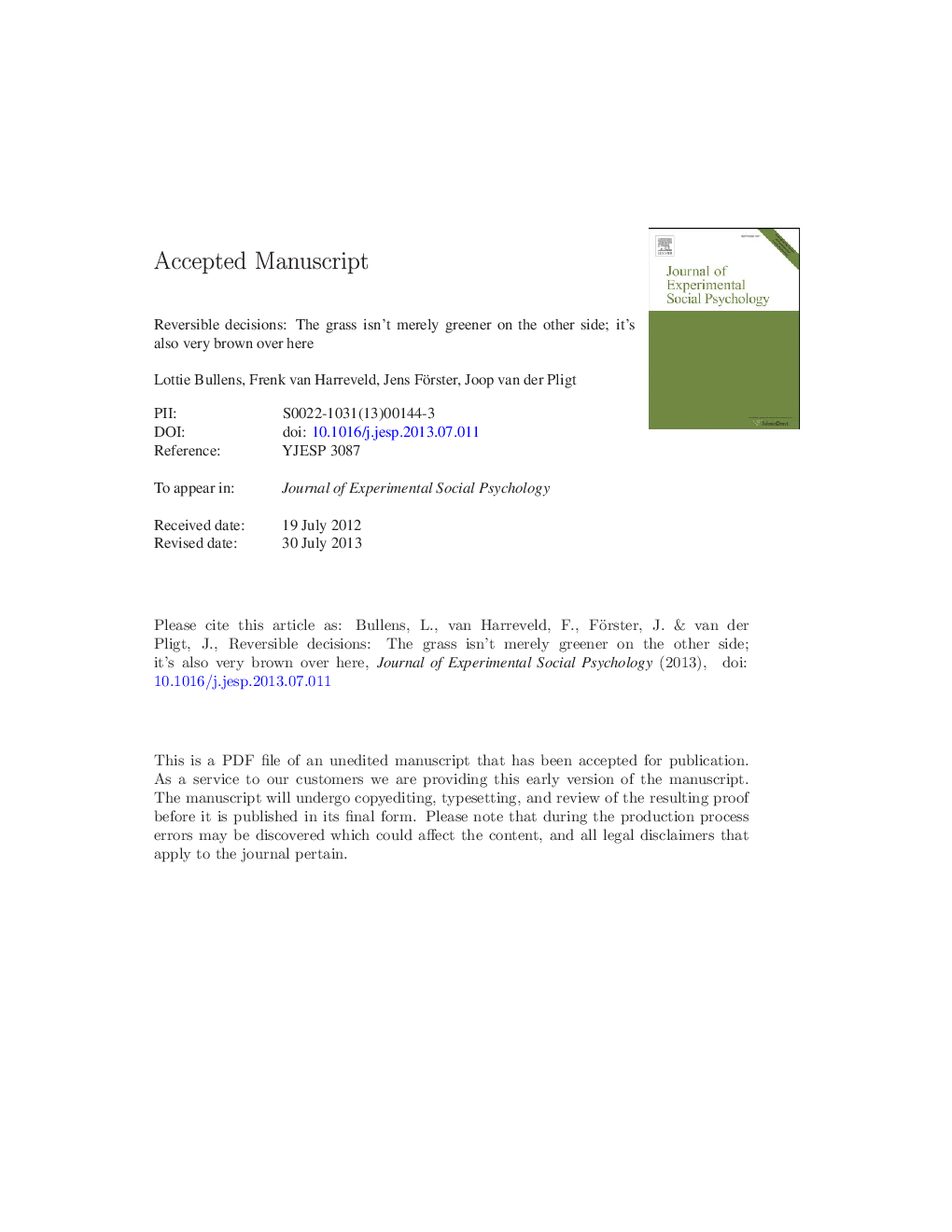| کد مقاله | کد نشریه | سال انتشار | مقاله انگلیسی | نسخه تمام متن |
|---|---|---|---|---|
| 10468547 | 926447 | 2013 | 32 صفحه PDF | دانلود رایگان |
عنوان انگلیسی مقاله ISI
Reversible decisions: The grass isn't merely greener on the other side; it's also very brown over here
ترجمه فارسی عنوان
تصمیمات برگشت پذیر: چمن نه تنها سبزتر از طرف دیگر است؛ در اینجا نیز بسیار قهوه ای است
دانلود مقاله + سفارش ترجمه
دانلود مقاله ISI انگلیسی
رایگان برای ایرانیان
کلمات کلیدی
برگشت پذیر بودن تصمیم، دسترسی، اختلال شناختی، رضایت،
ترجمه چکیده
مردم معمولا می گویند ترجیح می دهند فرصتی برای تجدیدنظر در تصمیمات در یک زمان کوتاهتر داشته باشند. با این حال تحقیق نشان داده است که تصمیم گیری برگشت پذیر به عنوان مقابله با سطوح بالاتر رضایت پس از انتخاب، منجر به کاهش می شود (گیلبرت و ایبرت، 2002). در سه مطالعه ما قصد داریم بینش هایی را در مورد فرایندهای اساسی این عقیده غیرقابل توجیه بدست آوریم. نتایج ما نشان می دهد که تصمیم گیری غیرقابل برگشت پذیر، دسترسی به جنبه های مثبت جنبه های انتخاب شده و منفی جایگزین های رد شده را افزایش می دهد. از این رو، با توجه به آنچه که براساس تئوری ناسازگاری شناختی انتظار می رود، نتایج تصمیم گیری غیرقابل برگشت، به تمرکز بر جنبه های تصمیم می پردازد که رضایت انتخاب را بهینه سازد. با این حال، پس از تصمیم گیری برگشت پذیر، جنبه های منفی جنبه های انتخاب شده و مثبت جایگزین هایی که رد شده اند تمایل بیشتری نسبت به دسترسی بیشتری دارند. ظاهرا، تصمیمات برگشت پذیر، به طور مستقیم مردم را به جنبه های تصمیم گیری هدایت می کند که به طور بالقوه رضایت از جایگزین انتخاب شده را کاهش می دهد.
موضوعات مرتبط
علوم زیستی و بیوفناوری
علم عصب شناسی
علوم اعصاب رفتاری
چکیده انگلیسی
People generally say they prefer to have the opportunity to revise decisions at a later point in time. Research has shown, however, that reversible decision-making leads to lower as opposed to higher levels of post-choice satisfaction (Gilbert & Ebert, 2002). In three studies we aimed to gain insight into the underlying processes driving this counterintuitive finding. Our results show that irreversible decision-making increases the accessibility of the positive aspects of the chosen and the negative aspects of the rejected alternatives. Hence, in line with what would be expected on the basis of cognitive dissonance theory, irreversible decision-making results in a focus on aspects of the decision that optimize choice satisfaction. After reversible decision-making, however, the negative aspects of the chosen and the positive aspects of the rejected alternatives tend to become relatively more accessible. Apparently, reversible decisions automatically direct people's attention to those aspects of the decision that potentially decrease satisfaction with the chosen alternative.
ناشر
Database: Elsevier - ScienceDirect (ساینس دایرکت)
Journal: Journal of Experimental Social Psychology - Volume 49, Issue 6, November 2013, Pages 1093-1099
Journal: Journal of Experimental Social Psychology - Volume 49, Issue 6, November 2013, Pages 1093-1099
نویسندگان
Lottie Bullens, Frenk van Harreveld, Jens Förster, Joop van der Pligt,
